The modern bear began its journey in Eurasia about five million years ago. They diversified their features and sizes as they spread throughout Europe, Asia, and into North America. Bears eventually made their way to South America as well. Archeological evidence points to a now gone African bear species.
Throughout history, many species of bear went extinct through natural processes. These days, human colonization and excessive hunting threatens bears around the world.
In North America, the bear lived in tandem with indigenous people for centuries. The people hunted bears for claws, fur, and meat. The bears occasionally killed humans that got too close to their cubs or a food source. Neither species overly threatened the other.
When colonizers arrived on the North American continent, everything changed. The colonizers treated both bears and indigenous peoples as pests. This mindset led to the mass murder of the bears and native folks.
In addition, these colonizers burned, cut, and cleared most of the forests. This left bears without habitats to hunt, play, and grow in. By the middle of the 20th century, bear populations were a fraction of pre-colonial numbers.
More recently, humans have helped bear populations rebound by about 60% through intense wildlife management and conservation.
If Tennessee is on your bucket-list, you’ll want to get prepared for a potential bear encounter. Here are five hotspots for bears in Tennessee.
Where is Tennessee?
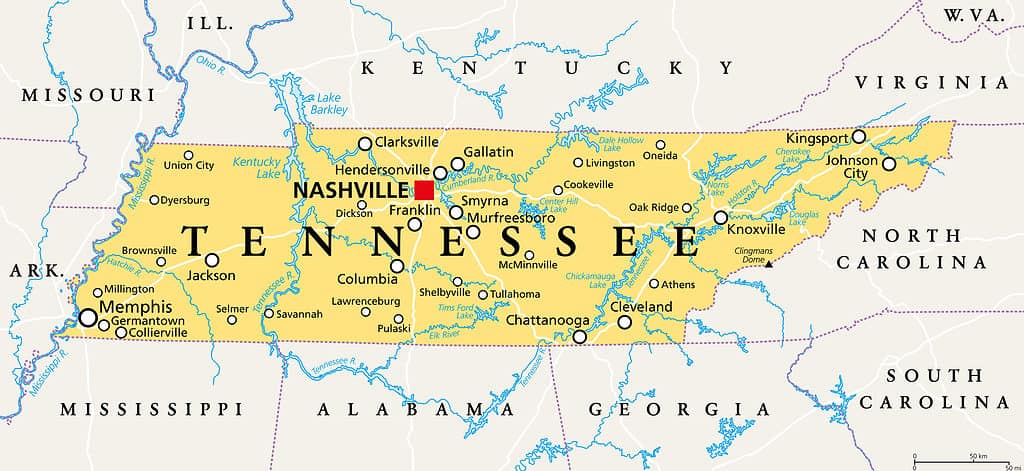
Tennessee is a land-locked state.
©iStock.com/PeterHermesFurian
Tennessee is stolen land that the Chickasaw, Shawnee, Yuchi, and Cherokee lived within, among others. The name Tennessee comes from the word “Tanasi” which is either a Cherokee or Yuchi word.
During the “Indian Removals of the 1800s” colonizers forced native peoples to migrate to Oklahoma or killed them. In 1838, Indigenous people had to walk a thousand miles through harsh travel conditions and nearly 4,000 died.
There are currently no federally recognized tribes in Tennessee. The Central Band of Cherokee seeks federal recognition to this day. The Native American Indian Association of Tennessee works to give Native American’s equity in everyday life.
Which Species of Bear Lives in Tennessee?
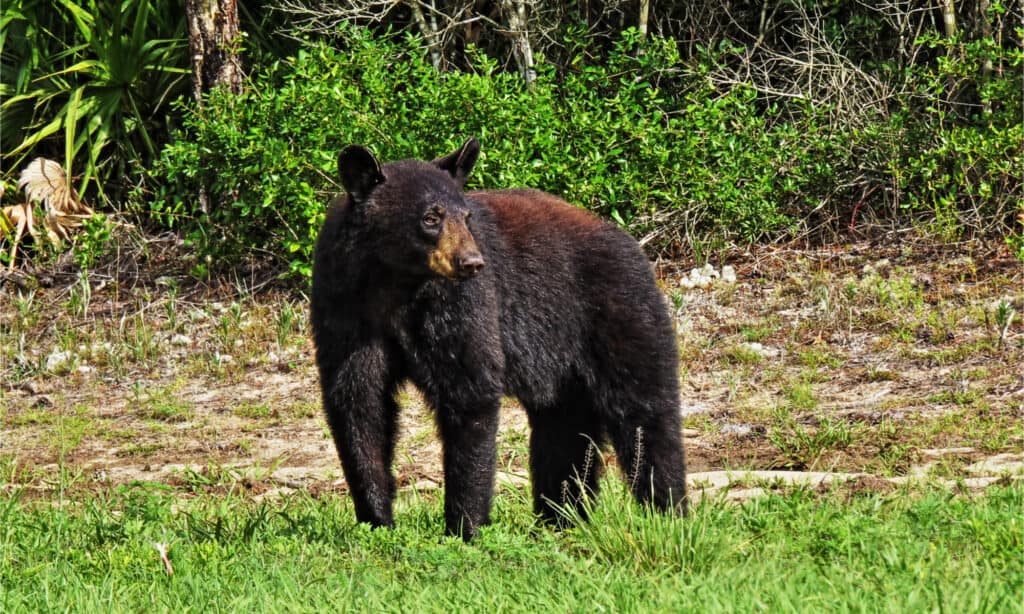
Black bears tend to avoid people.
©Roger Epps/Shutterstock.com
The American black bear is the only species found in Tennessee. There are many black bears in the area, with numbers ranging between 5,500 to 6,000. The state is committed to conservation efforts and the population is slowly increasing.
About the American Black Bear
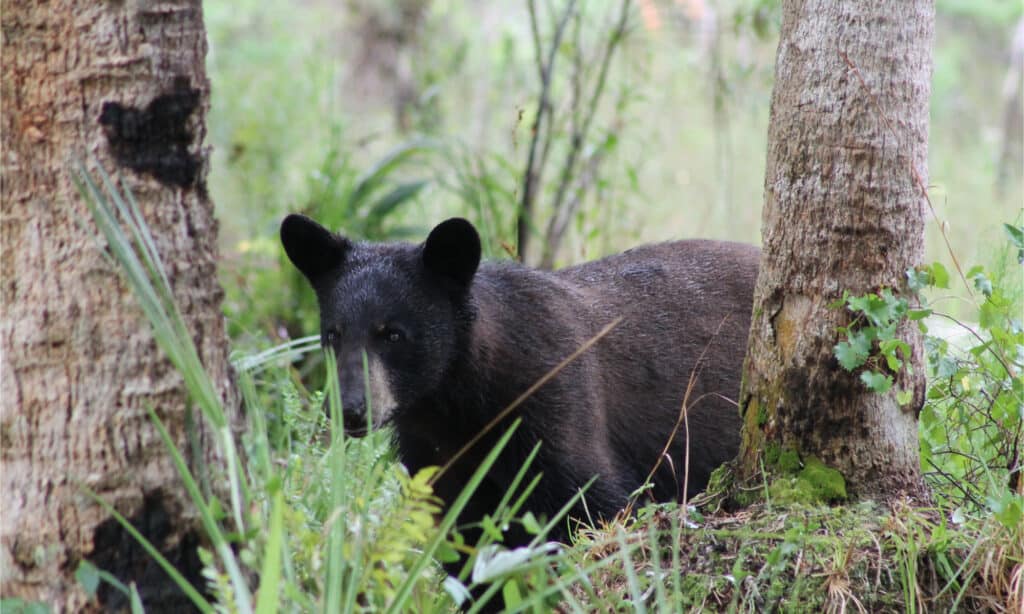
The black bear lives from Canada down to Mexico on the North American continent.
©Robin Cabral/Shutterstock.com
The American black bear tends to live in densely forested areas that are usually also mountainous. These animals can live anywhere between 20 and 40 years. They live nocturnal and solitary lives.
Black bears are only seen in groups around an ample food source or during mating season. They can also run up to 30 miles-per-hour. Infants are called cubs and litters will generally consist of three cubs per season.
Size/Appearance
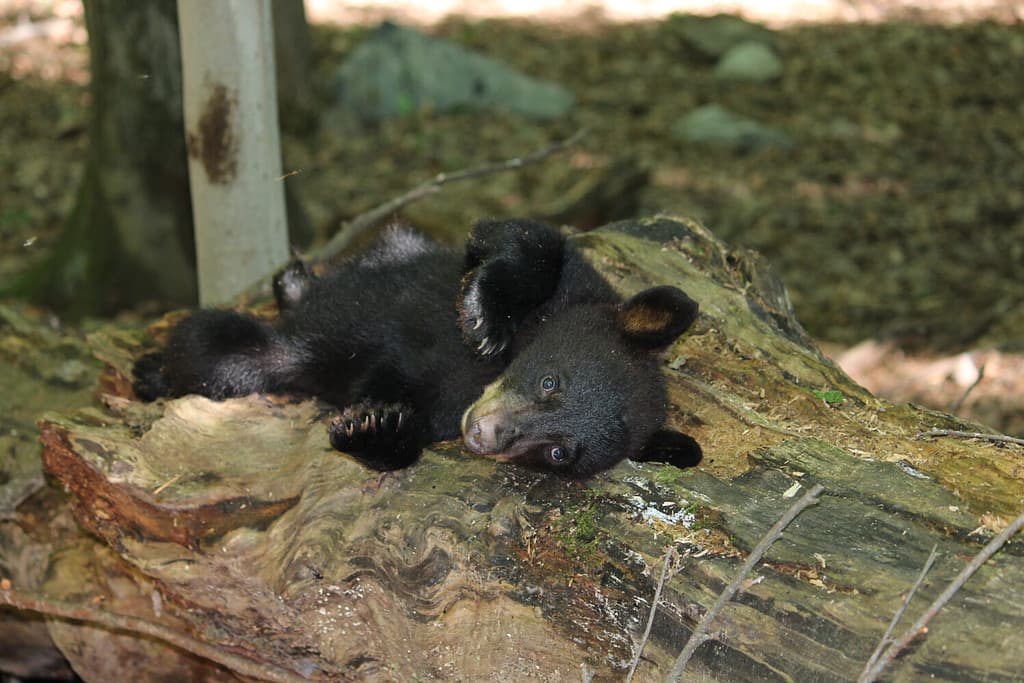
Most black bears have a thick, black coat, but it can look dark brown, grayish-blue, blond, or cinnamon.
©Susan Kehoe/Shutterstock.com
Black bears are known for their thick fur that comes in a range of colors. In Tennessee, the bears are usually black with a straight, lighter brown snout. Sometimes people see rust-, cinnamon-, and brown-colored bears.
The average adult bear will be about three feet tall on all fours and six feet long. Their weight ranges between 125 and 600 pounds. While black bears do not have a hump on their shoulders, their back ends are generally taller than their fronts.
Black bears have shorter claws than other species, which make them expert climbers. They are also wonderful swimmers. They have rounded ears and small eyes.
Diet
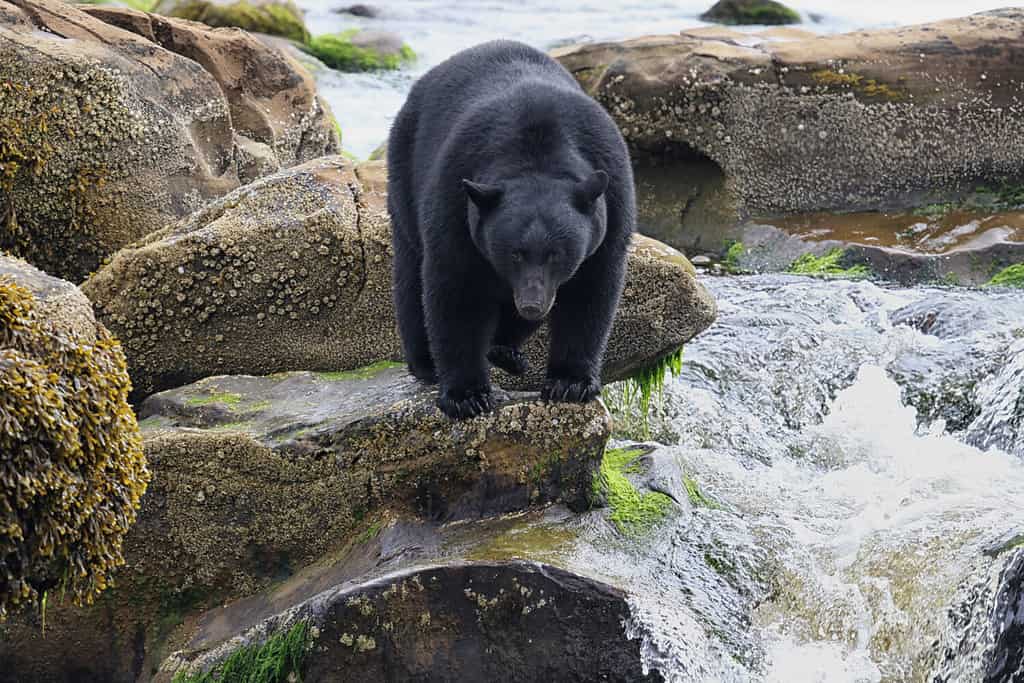
Black bears are omnivores.
©Mark Caunt/Shutterstock.com
Black bears will eat whatever is available for them each season. They will munch on berries, fruits, roots and grasses. When possible, they’ll include insects, small rodents, bird eggs, and carrion into their diets.
People have also witnessed these animals hunting young deer and catching fish.
Black bears will become easily accustomed to human and pet food. They’ll forage in trash cans and dumpsters once they’ve gotten a taste.
Predators
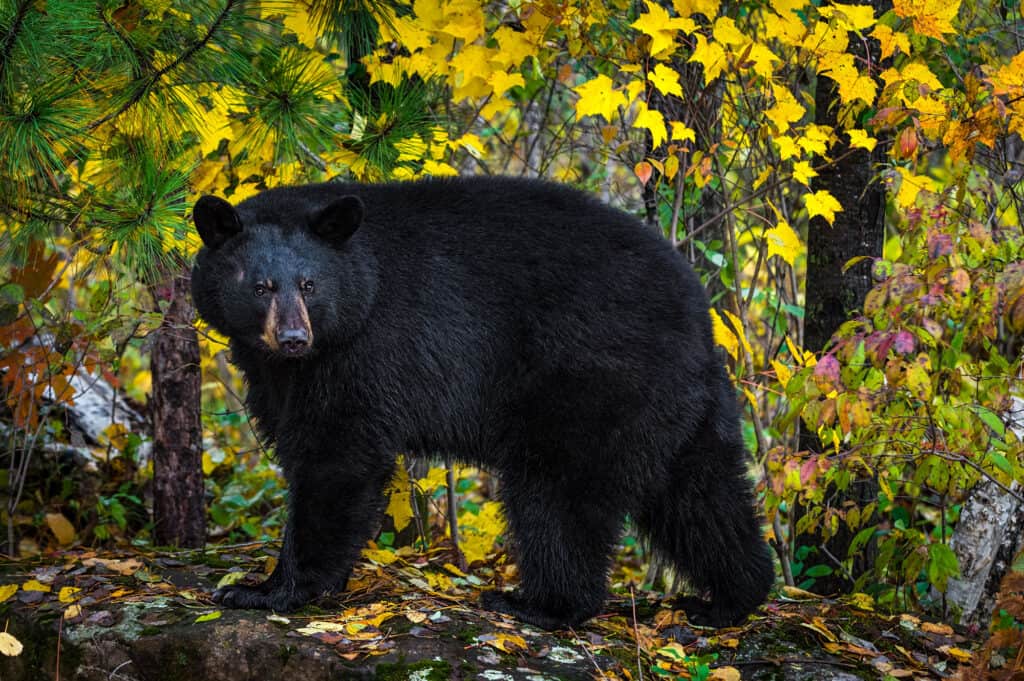
Black bears are very curious because of their incredible intelligence.
©Holly Kuchera/Shutterstock.com
Cubs face many dangerous growing up in the forest. They are commonly caught by birds of prey and foxes if unattended. They will also be killed by other black bears.
Grizzly bears kill both adult black bears and cubs if the two sub-species share the same habitat. In Tennessee, there are no grizzly bears.
Where are Bears in Tennessee?
Humans can see black bears throughout the state of Tennessee. If you want to spot the animals, the eastern sections of the state are your best bet. Here are five hotspots for bears in the southern state.
#1 Great Smoky Mountains National Park
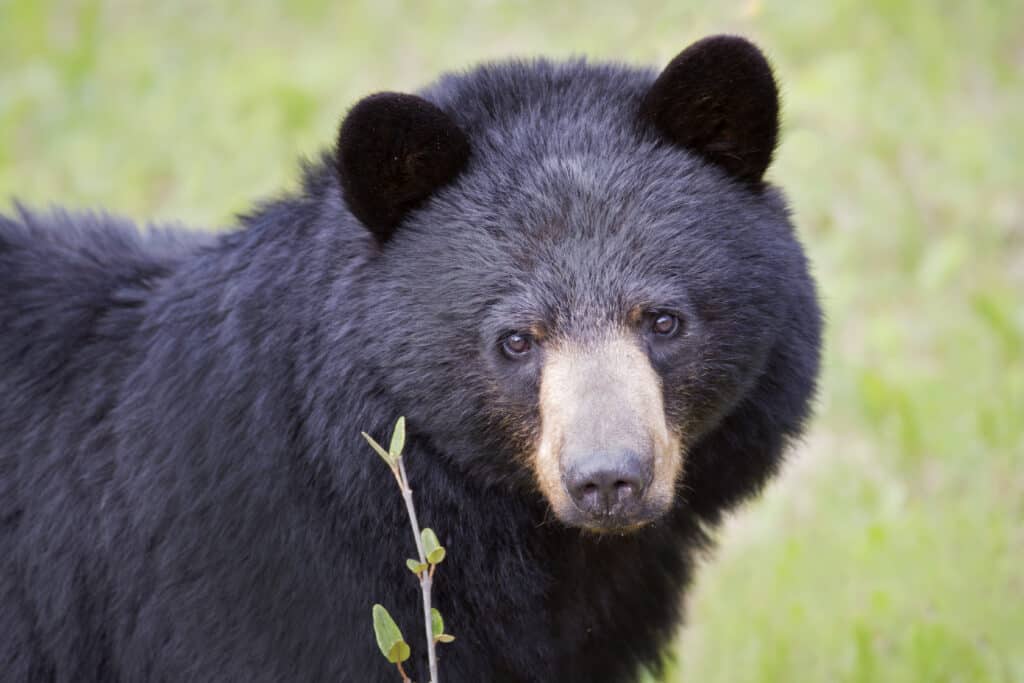
Black bears hibernate through the winter.
©Wild Art/Shutterstock.com
With a population of over 1,500 black bears, the Great Smoky Mountains National Park has the greatest concentration of the animals in Tennessee. Under federal protection, the bears inhabit all elevations of the park.
Bears do most of their activity in the early morning and late evening hours during the spring and summer. During the winter, the animals hibernate throughout the park.
#2 Blount County, TN
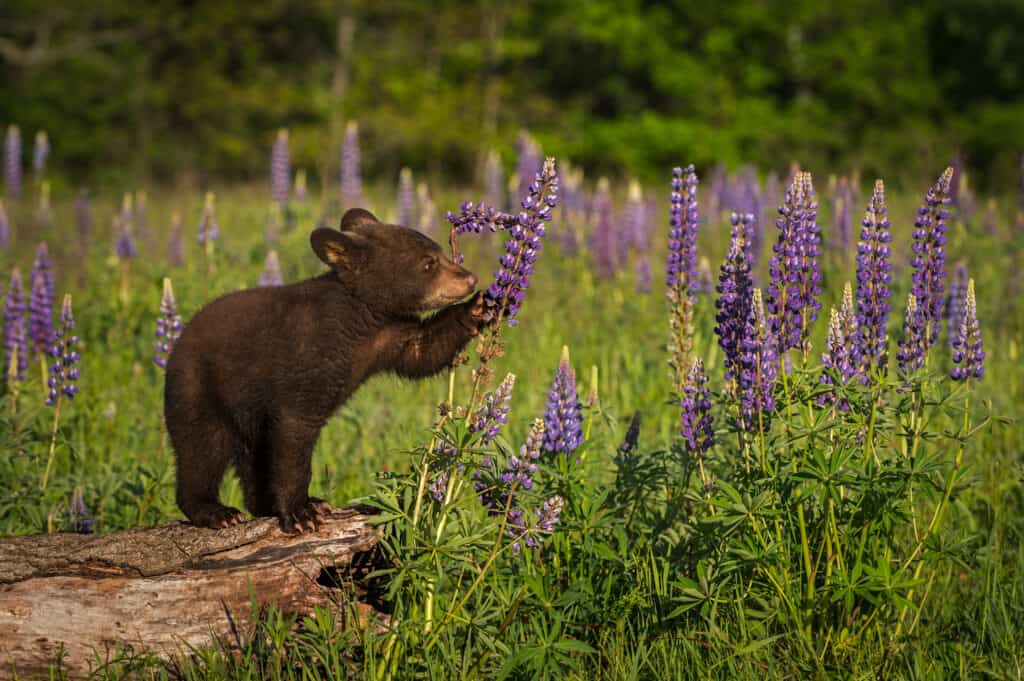
Life can be dangerous for bear cubs.
©Geoffrey Kuchera/Shutterstock.com
Another significant population of black bears lives in the Blount County area of Tennessee. The central county is just outside of Knoxville. The area is in southern Appalachian territory. The black bears live throughout the mountain range.
In July 2023, a parent bear and their cubs went onto someone’s “property”. The human shot and killed the adult. This left two cubs without a parent to care for them. The cubs went to the Appalachian Bear Rescue.
#3 Cumberland Plateau
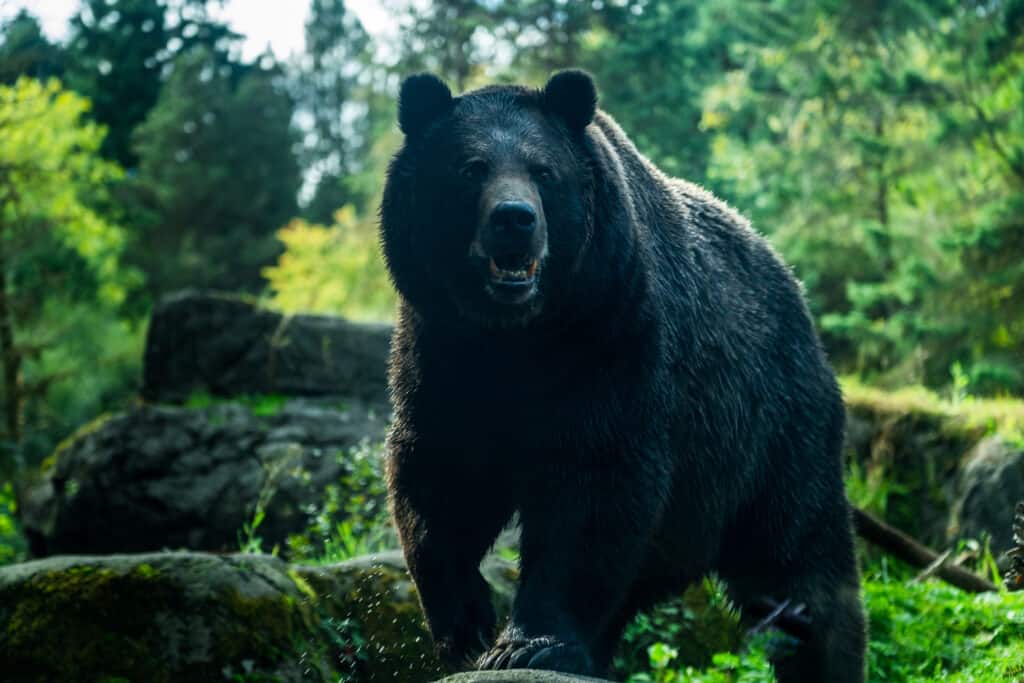
Black bears love to live in forested areas.
©elena_prosvirova/Shutterstock.com
A large portion of black bears that live in Tennessee live within the Cumberland Plateau range. The Plateau is in the southern part of the Appalachian range and extends into Kentucky, Alabama, and Georgia.
With the loss of the American chestnut tree, colonial habitat destruction, and overhunting, black bears were almost eliminated from this area of Tennessee by the 1900s. Throughout the 1970s, humans rarely saw bears in the area.
From the 1980s forward, hikers and explorers have more commonly seen bears on the Cumberland Plateau.
#4 Cherokee National Forest
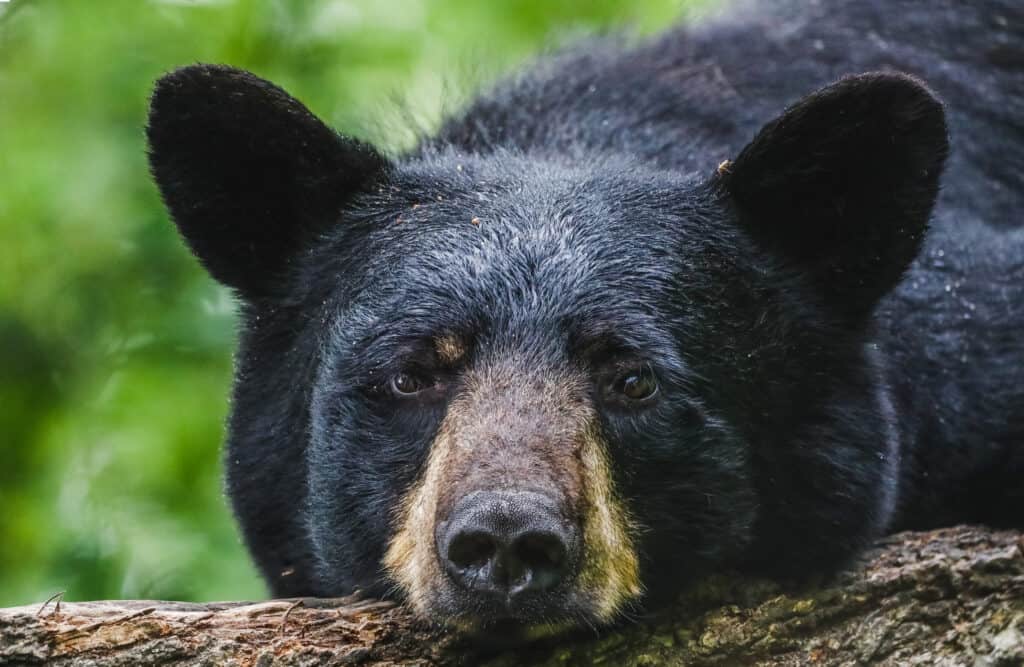
Black bears will use their front paws to grab berries off high branches.
©iStock.com/Mandy Fuller Photography
Black bears can also be seen within Cherokee National Forest, with a few folks having close bear encounters in campgrounds in the park.
Campers can spend nights in the forest, though they must keep their food securely locked within vehicles or with special padlocks to keep the animals away.
#5 Big South Fork National River
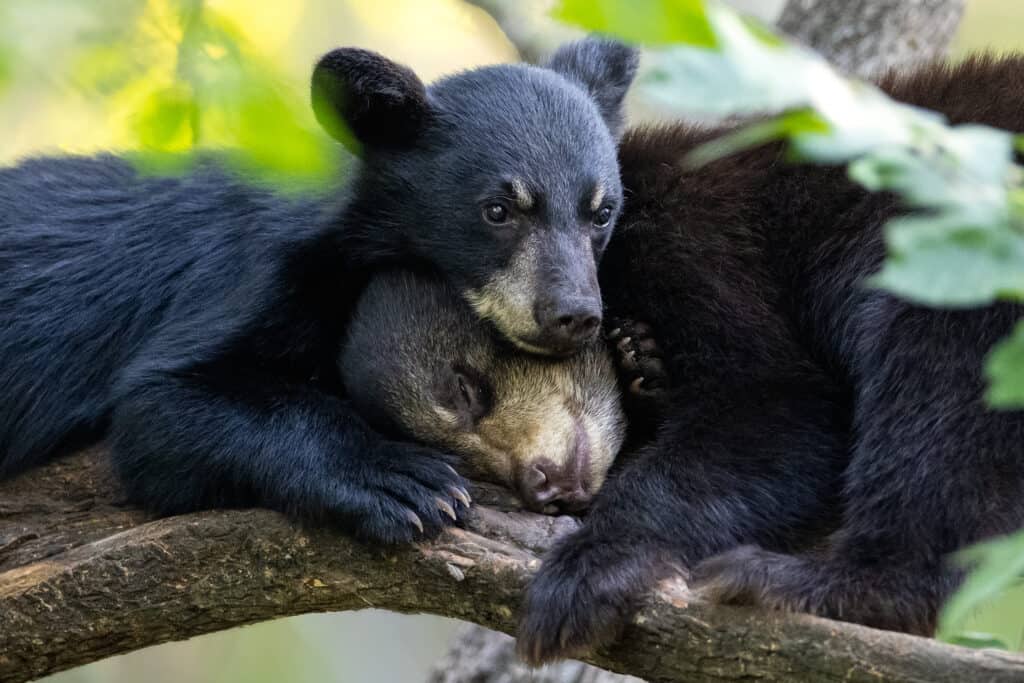
Black bear litters average one or two cubs.
©iStock.com/Annalise Kaylor
At Big South Fork, there are a significant number of bears. Biologists observed that bears at Big South Fork weighed more than animals in nearby populations.
In addition, biologists introduced 14 black bears that could give birth to the area during the winter and summer of 1996 and 1997. The bears melded with the local population and strengthened the genetic pool.
What to do if You See a Bear
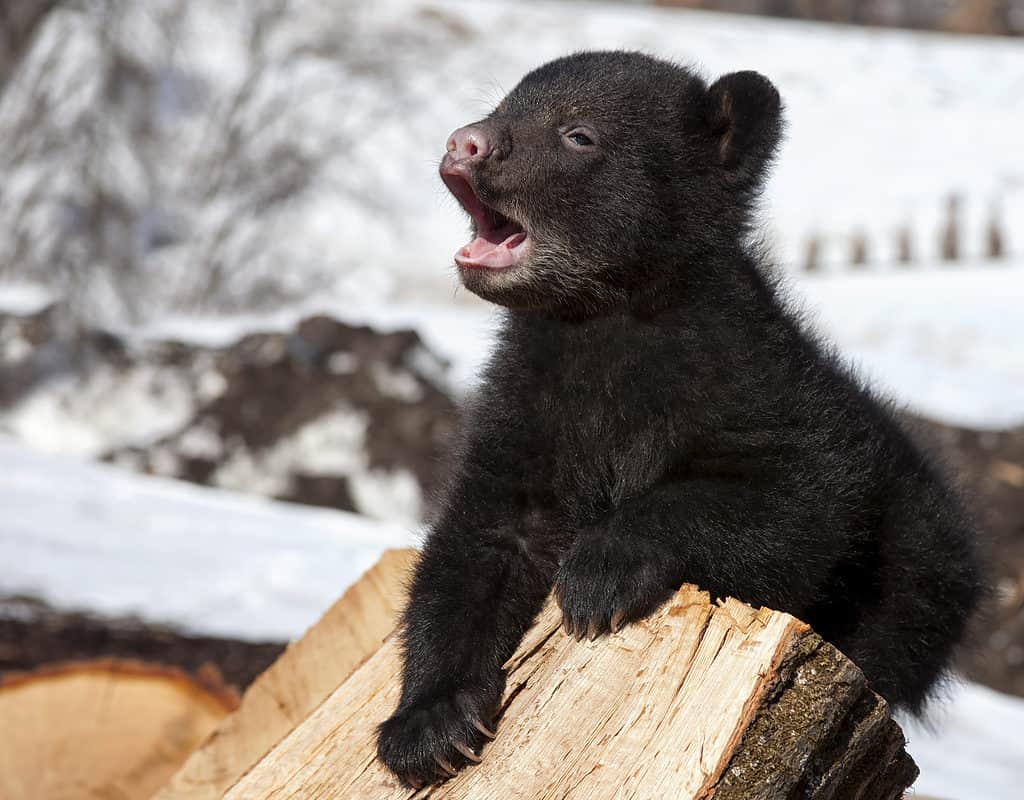
Bears are only dangerous if provoked or hungry.
©Critterbiz/Shutterstock.com
If you happen to see a black bear in Tennessee during your travels, here are steps you need to take to make it safely out of the situation:
- Stay calm, breathe deeply
- If it doesn’t see you, crouch down and back away slowly. Keep your eyes on the animal.
- If it sees you, stand up, wave your arms, and talk in a deep voice.
- If the animal doesn’t move away, shout, stomp your feet, and act aggressively.
- If the animal still does not move away, use bear spray if necessary.
- If you’re in a group, link arms above your heads and shout.
Here are a few things NOT to do when you encounter a bear:
- Run away
- Climb a tree
- Throw something at it
- Charge the animal
Summary of 5 Bear Hotspots in Tennessee
| # | Location |
|---|---|
| 1 | Great Smoky Mountains National Park |
| 2 | Blount County |
| 3 | Cumberland Plateau |
| 4 | Cherokee National Forest |
| 5 | Big South Fork National River |
The photo featured at the top of this post is © jo Crebbin/Shutterstock.com
Thank you for reading! Have some feedback for us? Contact the AZ Animals editorial team.






